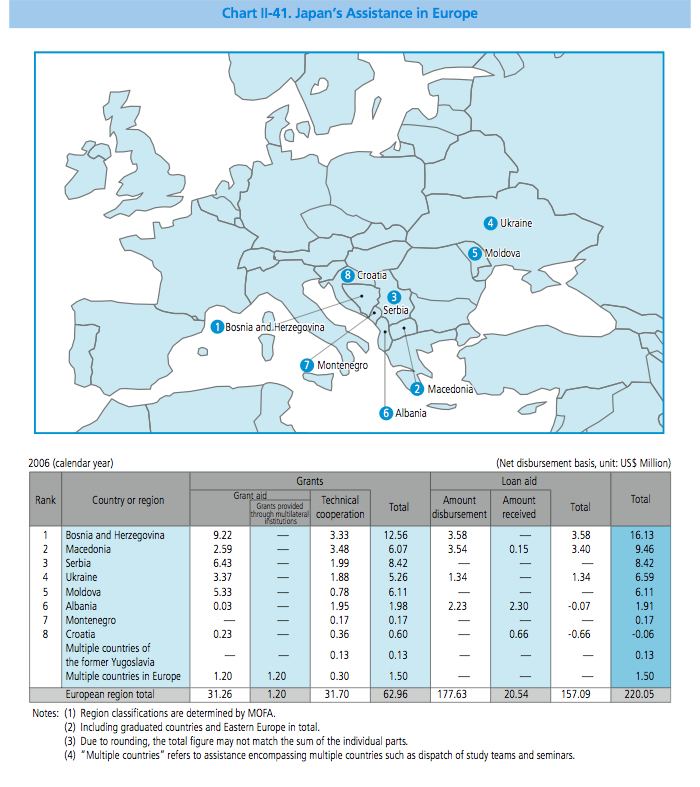Japan's Official Development Assistance White Paper 2007
Main Text > Part II ODA RECORD FOR FY2006 > Chapter 2 Details about Japan's Official Development Assistance > Section 3. Assistance for Each Region > 8. Europe
8. Europe
< Record for FY2006 >
Japan's bilateral ODA to the European region in 2006 was approximately US$220.05 million, 2.9% of total bilateral ODA.
< Features of Europe >
The Baltic countries and the Central and Eastern European countries have shed the former socialist system and are moving toward market-based economies and democratization. Japan is providing assistance to these countries to further these efforts. Today, the degree of development varies greatly among the countries in Central and Eastern Europe. Eight countries including the Baltic countries, (Poland, Hungary, the Czech Republic, Slovakia, Slovenia, Estonia, Latvia, and Lithuania) have actively advanced domestic reforms while receiving assistance from various countries, and acceded to the EU in May 2004. Romania and Bulgaria followed in January 2007. Japan has provided continuous and wide-ranging assistance for stable transitions by improving the lives of citizens who experienced economic and social difficulties that accompanied transitions. Countries which became EU member states are no longer beneficiaries of Japan's official development assistance, and the environment for assistance to the European region is changing.
< Japan's Efforts >
As the Baltic countries and the Central, and Eastern European countries have been developed, the role of Japan's assistance is also changing. Under the circumstances, it is necessary to shift its assistance to regions and sectors with higher needs. In the European region countries with high priority for assistance are shifting to those which are less developed, such as Western Balkan countries which experienced economic decline due to the conflict of the former Yugoslavia in the 1990s, as well as countries like Ukraine and Moldova.
● Assistance for new EU Member States
Assistance for the new EU member states must be gradually reduced in accordance to the level of economic development of each of these countries. For countries where economic development is advanced, it is necessary to search for new ways of bilateral cooperation for post-ODA. For example, it includes tying the results of ODA achieved up to now to cooperation between research organizations of private sector enterprises and universities of the two countries. Japan intends to share its experience as a donor to assist countries which are transitioning from being aid recipients to donors. In addition, Japan is promoting triangular cooperation for providing assistance jointly with these new donor countries to countries in the surrounding region which are at a low stage of development. Such efforts would not only promote the development of recipient countries, they would also allow countries involved in triangular cooperation to accumulate experience as donor countries.
● Assistance for the Western Balkan region
Countries in the Western Balkans which suffered considerable damage as a result of the conflict of the former Yugoslavia in the 1990s are finally moving from a stage of restoration and reconstruction to a stage of development with a view toward EU accession in the future. For the Western Balkan region, Japan has been rebuilding infrastructure that had been damaged during the conflicts and has been providing assistance focused on the health and medical care sectors. Recently, in line with the progress towards a market economy in each country, Japan has been dispatching experts to promote investment and providing training to develop SMEs and facilitate trade for consolidation of peace. It has also been providing assistance for ethnic reconciliation as well as assistance for socially vulnerable people such as the refugees and returnees in Bosnia and Herzegovina. In the environmental sector, which presents a common challenge for the Balkan region, Japan has been sending experts and providing training, as well as engaging in cooperation through development studies to address soil and sewage contamination in the former Yugoslav Republic of Macedonia and Albania.
In Ukraine, which is in the European region of the former Soviet Union, President Viktor Yushchenko was inaugurated in January 2005 and democratization has progressed. Against this backdrop, bilateral relations with Japan have strengthened, as evidenced by the visit of President Yushchenko to Japan in July 2005, as well as the visit of Foreign Minister Taro Aso to Ukraine in July 2006. In view of such developments, Japan will collaborate with the international community to support the efforts of Ukraine for further democratization and transition to a market economy.
For Moldova, which is the least developed country in the European region and whose primary industry is agriculture, Japan has been providing agricultural machinery and tools as part of its assistance to impoverished farmers and has made a large contribution to the country's self-sufficiency ratio of agricultural products.
Chart II-41. Japan's Assistance in Europe



 Next Page
Next Page